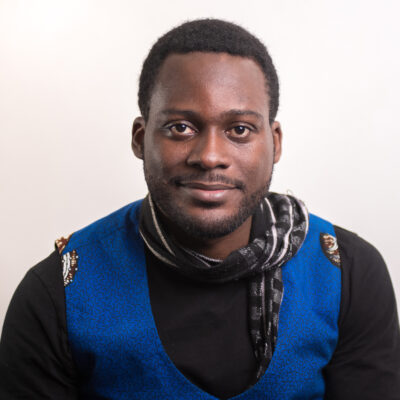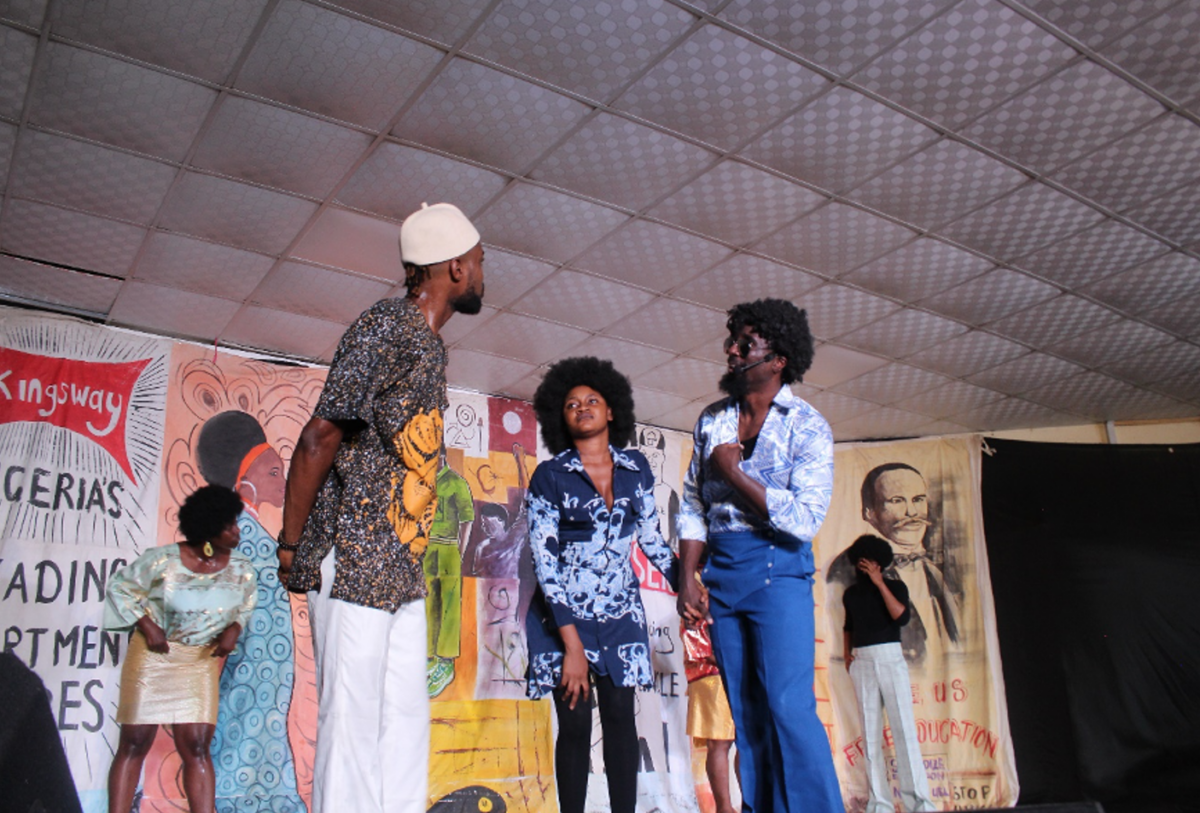
Made in Nigeria
‘It is TOTAL THEATRE – dance, drama, music, art, fashion and, of course, poetry – that come together to tell the story of our 108 years of shared history. All told in 120 minutes that will pass sooner than you think.’
Made in Nigeria is a theatre performance that uses humour and spectacle to hold audiences across the country spellbound. Meanwhile, it educates communities about their lost history, and spreads the message of unity in diversity, hope and civic responsibility.
Strategies include:
- Connecting with communities
Made in Nigeria accesses the literary networks of poet and founder Dike Chukwumerije, and invites local support acts to perform. - Local relevance
The show has flexible sections that are adapted with each performance to local tastes and uses colour, drama and song to enliven history. - Staying balanced
In a country where history is controversial and politics can be dangerous, Made in Nigeria takes a balanced stance. Often, simply presenting a silenced or contested topic is enough to engage an audience. - Marketing
The show leverages word of mouth and social media for cost-effective marketing. - Accessibility and inclusion
Made in Nigeria caters to audience needs, including using accessible venues, avoiding Muslim prayer times and offering discounted tickets for low-income groups.
Made in Nigeria is a theatre performance founded by Dike Chukwumerije’s Simply Poetry Troupe in 2016 and has become an important part of Nigeria’s civil and ethnic integration project.
Nigeria has long been polarised along ethnic and religious lines, and suffered through a civil war (1967-1970). History is a controversial topic in the country and often avoided, which increases misconception and community tension. The Nigerian government removed History from the Nigerian school curriculum in 2009. Although it was reintroduced in 2017, several aspects of the country’s history are notably absent from the curriculum.
Made in Nigeria has made it a mission to educate communities about their common histories. As Dike explains, ‘It is TOTAL THEATRE – dance, drama, music, art, fashion and, of course, poetry – that come together to tell the story of our 108 years of shared history. All told in 120 minutes that will pass sooner than you think.’
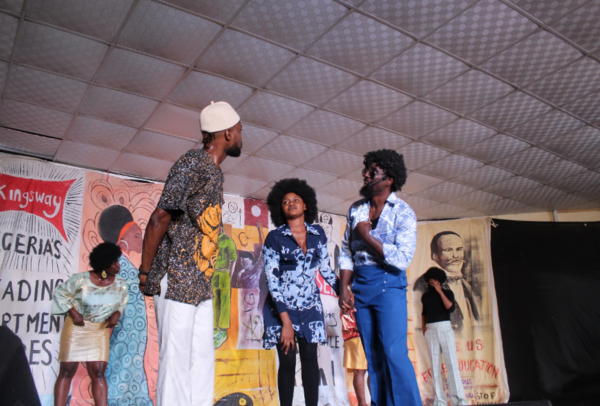
A slice of history: A scene from Made in Nigeria (Photo courtesy: Hussain Zaguru)
And audiences are respondinging. Adaeze Anah (a lawyer and creative) said, ‘Whatever part you choose to play in this Nigerian story, one thing is sure. We are a UNITED PEOPLE…Thank you Dike Chukwumerije for reminding us to rise up to our obligations in the Nigerian social contract and to do so with a hunger for a better Nigeria and with a conscience…Let’s stay united in love and progress.’
The show has been staged numerous times in 18 of Nigeria’s 36 states, with plans to expand across the country. Made in Nigeria always gets a standing ovation, despite the stark difference in ethnicities, culture and traditions across Nigerian states.
Connecting with communities
Before Made in Nigeria started, Dike had gained influence as a literary presence by performing stellar poetry and spoken word at literary festivals, political gatherings and other events. This generated interest in his show among literary enthusiasts.
Dike and his team liaise with local community members to perform as opening acts to Made in Nigeria’s performances, which fosters friendship and a sense of belonging. It gives local creatives a platform and helps them to grow their careers.
Local Relevance
Dike says, ‘so far, we have taken the show to all the six geo-political zones that make up the country and tested it on a wide variety of audiences to overwhelmingly positive reviews.’
The diverse views and opinions of Nigerians were considered while scripting the show, to ensure people from different cultural backgrounds could find references to relate to. Dike further adds that, in performance, the show was designed to be flexible. ‘There are parts of the show we modify from location to location to accommodate local tastes. These modifications are purely with reference to the aesthetics of the production. The message and storyline never change.’
Dike’s dexterity in delivering his messages extends the invitation to people who know nothing about art or poetry because he uses relatable historical and everyday images, drama, voice and song to colour his show. He brings people together, bound by their common love for Nigeria. Mostly, the show tackles history which is not readily accessible to people.
Staying neutral
Dike doesn’t pick sides, so no ethnic group or religion can lay claims to his show. This rules out perceived bias and the risk of favouritism. Also, Dike employs a somewhat satiric approach in discussing sombre issues like police brutality, government, politics and religion. This relatable style leaves the audience to decide what is wrong or right for themselves.
According to Dike, ‘the issues we address are sensitive, topical and divisive. This guarantees you a broad-based following.’ To keep his audience interested in the show, he has to be objective and fair to all sides of the argument – and extremely creative in representing this in an artistic way. ‘The content of the show – what is said and the creativity in how it is said – is what has helped attract and hold an audience.’
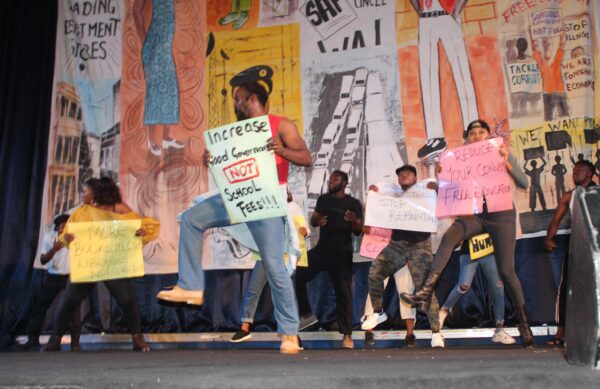
Depicting historical issues and tackling topical issues, a student protest scene from the Made in Nigeria show (Photo Courtesy: Hussain Zaguru)
Marketing
Dike’s team have largely depended on word-of-mouth and social media for publicity. Even if the progress is slow and organic, eventually they find supporters in every state they wish to visit – an existing group of people who have heard about the show and are willing to help drive publicity locally.
Accessibility & inclusion
The team carefully considers the needs of those who have registered for the event. They tailor certain aspects of the show in line with the context to encourage acceptability and audience participation.
Made in Nigeria is also considering using sign language to make the show more accessible. This will support inclusion and provide a broader base following for the show.
Discounted tickets are offered to demographics like students, and also early-bird tickets to encourage more people to attend the event.
A lot of consideration is given to selecting the venue for each show, so that different demographics will be comfortable to attend. Timing is also an essential factor in terms of inclusion. Show timing can make it difficult for certain people to attend. For example, Muslim members of the audience need to pray at certain times. Dike is careful not to allow his show to interfere with this. The show is also timed to last for 120 minutes and does not exceed this limit.
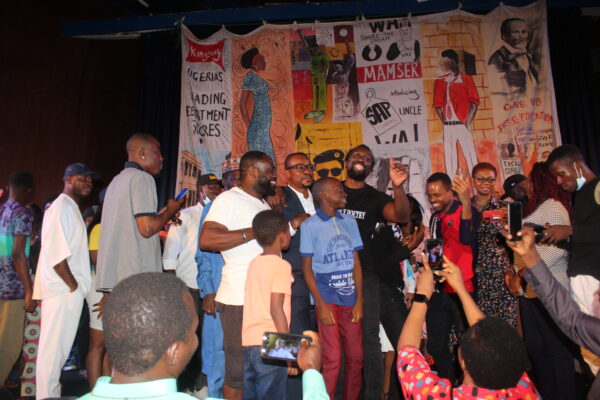
Always well received: Dike and an appreciative audience after the show (Photo courtesy: Hussain Zaguru)
Made in Nigeria has inspired other performances and projects across the country. It hopes to develop a standing community for audiences, allowing them to follow the show long-term, share experiences, develop ideas, and provide systematic support. After the last performance in Abuja a member of the audience, Osiniayah Happyprince Agu, noted that ‘Dike-Ogu remains the perfect performer holding a nation and its destinies before a pew of hearts.’
Su’ur Su’eddie Agema
Su’ur Su’eddie Agema is a multiple-award-winning writer, poet, cultural activist, and development consultant. Su’eddie was previously the Black History Month/Project Curator and co-founder/president African Writers at the University of Sussex, where he earned an MA with distinction in International Education and Development as a Chevening Scholar. He is currently a David C. Pollock scholar of the Families in Global Transition. Su’eddie heads SEVHAGE Publishing and SEVHAGE Literary and Development Initiative, while being the convenor of the Benue Book and Arts International Festival. He blogs at http://sueddie.wordpress.com and http://sevhagereviews.wordpress.com @sueddieagema on Twitter. He lives in a couple of places with his wife, daughter, and members of their clan.
What is the Imagine Around the World Project?
A partnership with the British Council Australia, the Imagine Around The World Project aims to document case studies from numerous countries outside of US, UK, Canada, Australia and New Zealand to share best practice and leadership in cultural diversity, cultural equity and inclusion in the arts, screen and creative sectors. This project is managed by Diversity Arts Australia and supported by Creative Equity Toolkit partner, British Council Australia. To find out more click below – or read the other case studies as they go live here.

